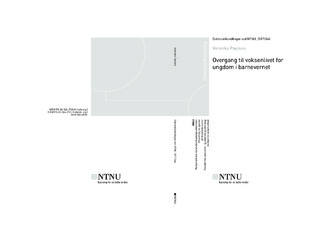Overgang til voksenlivet for ungdom i barnevernet
Doctoral thesis
Permanent lenke
http://hdl.handle.net/11250/2478174Utgivelsesdato
2017Metadata
Vis full innførselSamlinger
- Institutt for sosialt arbeid [1393]
Sammendrag
Sammendrag
Avhandlingen «overgang til voksenlivet for ungdom i barnevernet» er en artikkelbasert avhandling som består av fire artikler og ett bokkapittel, samt en sammenbindende kappe. Tidligere forskning har vist at overgangen til voksenlivet kan være utfordrende for denne gruppa, noe som gjør at det er behov for mer kunnskap om hva som er viktig for ungdommene i denne overgangen. Dette krever at de unge selv kommer til orde, og studien fokuserer derfor på ungdommenes egne tanker og erfaringer. Studien bygger på kvalitative intervjuer med 45 ungdommer i alderen 16-26 år, som alle har hatt tiltak fra barnevernet.
Funnene i avhandlingen viser at ungdommer som går ut av barnevernet opplever en brå overgang til voksenlivet med begrenset mulighet for veksling mellom selvstendighet og støtte. Dette gjelder både de som har vært under omsorg og de som har hatt hjelpetiltak. Den brå overgangen handler på den ene siden om at ungdommene har begrenset nettverk og lite tilgang på sosial støtte i uformelle relasjoner, samtidig som at de støttende relasjonene de har hatt i barnevernssystemet avsluttes på et sårbart punkt i livet. Når barnevernstiltak avsluttes mister ungdommene kontakten med voksne som kunne motivert dem, som kunne fokusert på deres positive bidrag i samfunnet og hjulpet dem til å finne ressurser og støtte videre inn i voksenlivet. Uten slik støtte er det en fare for at disse ungdommene vil streve i voksenlivet.
Det kommer frem i avhandlingen at medvirkning og sosial støtte er viktige momenter for å få til en god overgang til voksenlivet. Medvirkningsprosessene må baseres på en samarbeidsrelasjon hvor ungdommen gis reell mulighet til medvirkning, medbestemmelse og autonomi, og den sosiale støtten må inneholde både praktisk, emosjonell, bekreftende/ oppmuntrende støtte, samt støtte til gode medvirkningsprosesser. En god overgang til voksenlivet innebærer altså en kombinasjon av gode medvirkningsprosesser og mulighet for autonomi, og samtidig tilgang til gode sosiale relasjoner hvor man kan få støtte når man trenger det. I tillegg har de behov for anerkjennelse, da dette legger grunnlag for utvikling av selvtillit, selvrespekt og selvaktelse, som er forutsetninger for full inkludering i samfunnet. The doctoral thesis “transition to adulthood from child welfare services” is an article-based thesis which consists of four scientific articles, one book chapter and an embracing cape that links the thesis together. Previous research have showed that transition to adulthood can be challenging for this group of youth, which necessitate the need for more knowledge about what is important for the youths in this transition. This requires that the young people themselves are heard and this study therefor focuses on the youths own thoughts and experiences. The study draws upon interviews with 45 young people between the ages of 16-25, which all have received support from the child welfare service.
The thesis shows that young people leaving the child welfare system face a sudden adulthood, with limited possibilities of switching between independency and support. This is the case for both those who have been in care and those who have received assistant or home-based support from the child welfare services. The sudden adulthood is due to limited resources and social support in their informal network but also that the supportive relations they have had in the child welfare system are ended at a vulnerable period in life. When the support from the child welfare services are ended, the young people lose contact with adults that could have motivated them, focused on their positive contributions in society and helped them find resources and support that could follow them further into adult life. Without such support there is a risk that these young people will struggle in adult life.
The findings show that participation and social support are important elements for å good transition to adulthood. The participation processes must be based on a collaborative process where the youth are given real possibilities of participation, co-determination and autonomy, and the social support must contain practical, emotional, affirmational and participatory support. Good transition processes to adulthood imply a combination of good participation processes and the possibility of autonomy, simultaneously with access to social relation that can give support when needed. Also the need for recognition have appeared as significant through this study, as recognition lays the foundation for self-confidence, self-respect and the basis of self-esteem, which are a premises for full inclusion in society.
Består av
Paper 1: Paulsen, Veronika. Ungdommers erfaringer med medvirkning i barnevernet. Fontene forskning 2016 ;Volum 9.(1) s. 4-15Paper 2: Paulsen, Veronika. Ungdom på vei ut av barnevernet: brå overgang til voksenlivet.. Norges Barnevern 2016 ;Volum 92.(1) s. 36-51, is not included due to copyright available at 10.18261/issn.1891-1838-2016-01-04
Paper 3: Paulsen, Veronika; Berg, Berit. Social support and interdependency in transition to adulthood from child welfare services. Children and youth services review 2016 ;Volum 68. s. 125-131, https://doi.org/10.1016/j.childyouth.2016.07.006
Paper 4: Paulsen, Veronika og Thomas, Nigel. The transition to adulthood from care as a struggle for recognition, Child and Family Social Work 2017;1–9. https://doi.org/10.1111/cfs.12395
Paper 5: Marion, Élodie og Paulsen, Veronika (in review). The transition to adulthood from care: A review of current research. In Mann-Feder, Varda og Goyette, Martin (eds): Leaving care and the Transition to Adulthood – International contributions to Theory, Research and Practice. Oxford University Press, USA. Is not included due to copyright
